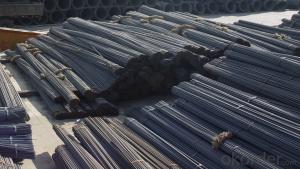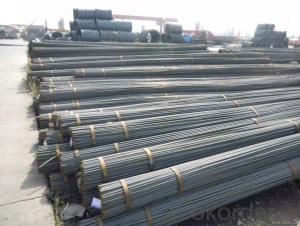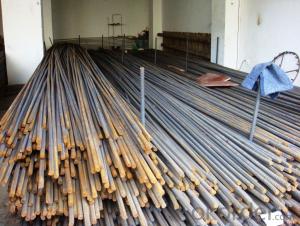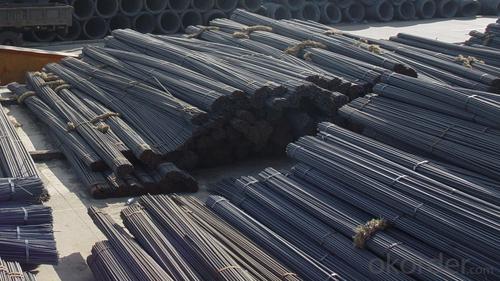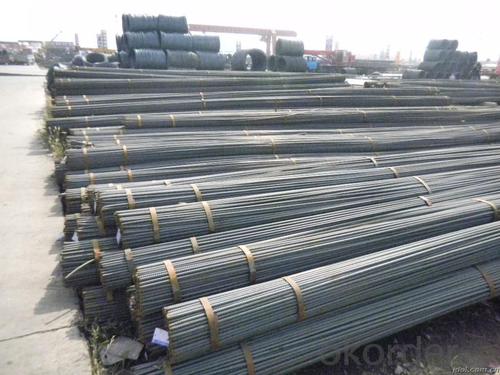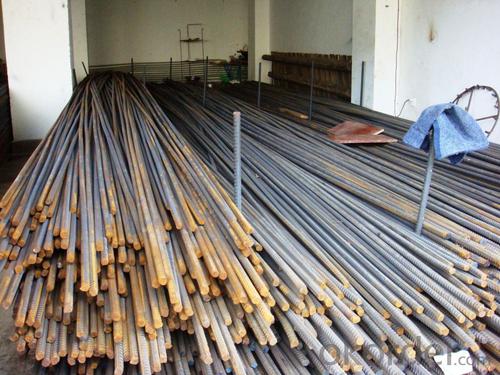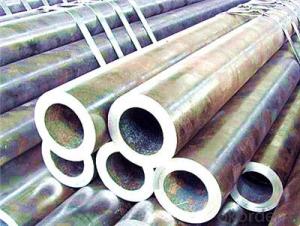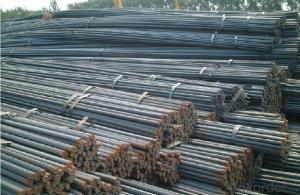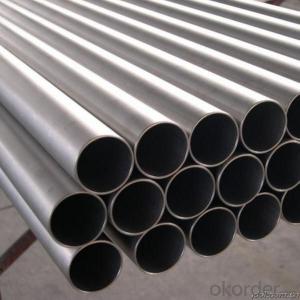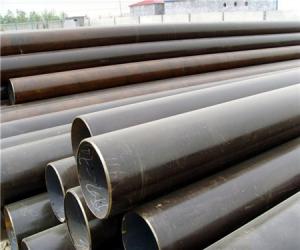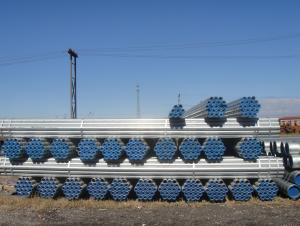Steels Manufacture Building Material with Good Quality Made in China
- Loading Port:
- Tianjin
- Payment Terms:
- TT OR LC
- Min Order Qty:
- 100 m.t
- Supply Capability:
- 1000 m.t/month
OKorder Service Pledge
OKorder Financial Service
You Might Also Like
1.Packaging & Delivery
Packaging Detail: | in bundles or as customer's requirement |
Delivery Detail: | Within 30days after receiving your deposit or copy of L/C |
2.Specifications
HRB400,HRB500 Steel Rebars
1.China direct supplier
2.Best service
3.Competitive price
4.Quantity assured
3.Product Description
Name | High Tensile Export Reinforcing Steel Bar ,Deformed Steel Bar ,HRB400B,HRB,46B,HRB500 Building Construction Material |
Standard | ASTM A615 /BS BS 4449 /GB HRB/ JIS G3112 |
Grade | A615 Gr40/60/75 BS 4449 Gr460,B500 GB HRB335,HRB400 ,HRB500
JIS G3112 SD390
|
Diameter | 6mm-40mm |
Length | 6-12m |
Technique | Low temperature hot-rolling reinforcing deformed steel rebar |
Tolerance | As the standard or as your requirement |
Application | Building, construction, road, bridge,etc |
Certificated | BV |
MOQ | 500tons per size steel rebar |
Packing details | Steel rebar packed in bundle or as your requirement |
Delivery | Within 30 days after deposit |
Payment | T/T or L/C |
4.Chemical Composition
Grade | Technical data of the original chemical composition (%) | |||||||
C | Mn | Si | S | P | V | |||
HRB400 | ≤0.25 | ≤1.60 | ≤0.80 | ≤0.045 | ≤0.045 | 0.04-0.12 | ||
Physics capability | ||||||||
Yield Strength(N/cm2) | Tensile Strength(N/cm2) | Elongation (%)
| ||||||
≥400 | ≥470 | ≥14 | ||||||
Grade | Technical data of the original chemical composition (%) | |||||||
C | Mn | Si | S | P | V | |||
HRB500 | ≤0.25 | ≤1.60 | ≤0.80 | ≤0.045 | ≤0.045 | 0.04-0.12 | ||
Physics capability | ||||||||
≥500 | ≥630 | ≥12 | ||||||
5. Theorectical weight
Diameter (MM) | Cross Sectional Area (MM2) | Theorectical Weight (KG/M) | Weight of 12M Bar (KG) | A Ton Contains 12M Bars (PCS) |
6 | 28.27 | 0.222 | 2.664 | 375.38 |
8 | 50.27 | 0.395 | 4.74 | 210.97 |
10 | 78.54 | 0.617 | 7.404 | 135.06 |
12 | 113.1 | 0.888 | 10.656 | 93.84 |
14 | 153.9 | 1.21 | 14.52 | 68.87 |
16 | 201.1 | 1.58 | 18.96 | 52.74 |
18 | 254.5 | 2 | 24 | 41.67 |
20 | 314.2 | 2.47 | 29.64 | 33.74 |
22 | 380.1 | 2.98 | 35.76 | 27.96 |
25 | 490.9 | 3.85 | 46.2 | 21.65 |
28 | 615.8 | 4.83 | 57.96 | 17.25 |
32 | 804.2 | 6.31 | 75.72 | 13.21 |
36 | 1018 | 7.99 | 98.88 | 10.43 |
40 | 1257 | 9.87 | 118.44 | 8.44 |
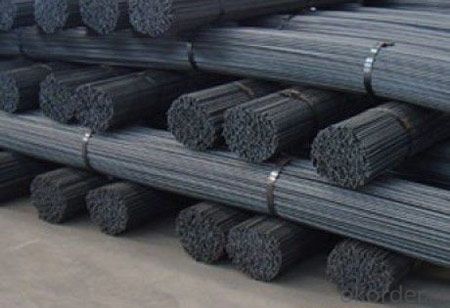
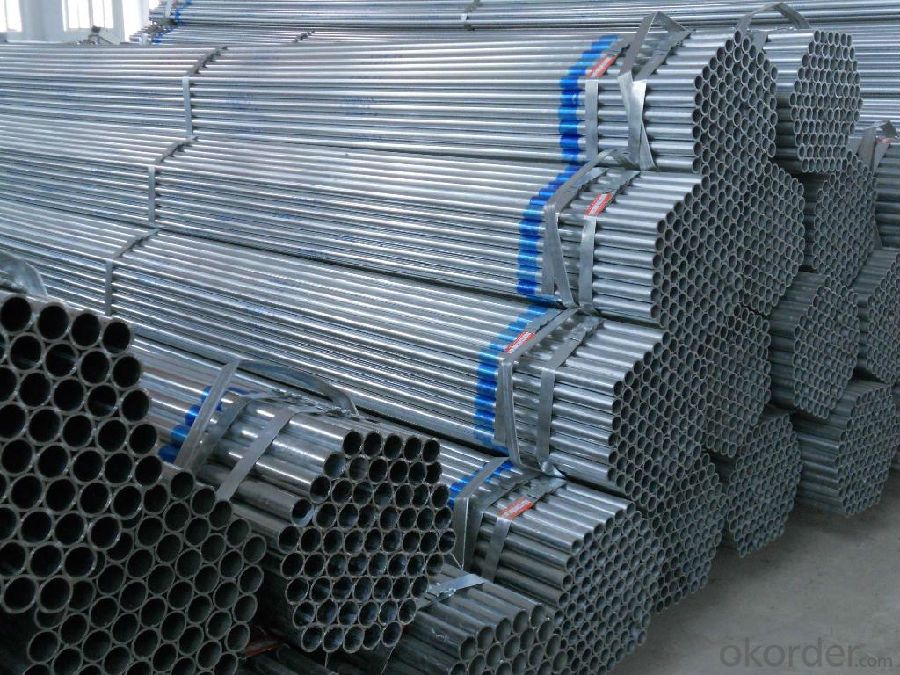
- Q: What are the common methods of joining steel pipes?
- The common methods of joining steel pipes include welding, threading, and using mechanical couplings. Welding involves fusing the pipes together using heat, while threading involves screwing the pipes together using threads on the ends. Mechanical couplings are devices that connect the pipes together using compression or other means.
- Q: How are steel pipes tested for mechanical strength?
- Steel pipes are tested for mechanical strength through various methods such as tensile testing, hydrostatic testing, and non-destructive testing. Tensile testing involves pulling the pipe until it breaks to measure its ultimate tensile strength. Hydrostatic testing involves pressurizing the pipe with water to check its ability to withstand high internal pressures. Non-destructive testing methods like ultrasonic testing or magnetic particle inspection are also used to detect any defects or weaknesses in the pipe without causing damage. These tests ensure that steel pipes are strong enough to withstand the required mechanical stresses.
- Q: Can steel pipes be coated for additional protection?
- Yes, steel pipes can be coated with various materials to provide additional protection against corrosion, abrasion, and other environmental factors. Coatings such as epoxy, polyethylene, and zinc can be applied to enhance the durability and lifespan of steel pipes, making them suitable for diverse applications in different industries.
- Q: What is the role of steel pipes in power plants?
- Steel pipes play a crucial role in power plants as they are used for the transportation of various fluids, such as water, steam, and oil, throughout the facility. They provide a reliable and durable means of conveying these substances under high pressure and extreme temperatures, ensuring the smooth operation of power generation processes. Additionally, steel pipes are also utilized for structural support in power plant construction, serving as a vital component in the overall infrastructure of the facility.
- Q: What is the role of steel pipes in the aerospace industry?
- Steel pipes play a crucial role in the aerospace industry as they are widely used for various applications such as fuel and hydraulic systems, air conditioning, and structural support. These pipes provide strength, durability, and resistance to high pressures and extreme temperatures, ensuring the safe and efficient operation of aircraft.
- Q: What is the difference between cast iron and steel pipes?
- The main difference between cast iron and steel pipes lies in their composition and manufacturing process. Cast iron pipes are made from a strong, durable material that consists primarily of iron, carbon, and silicon. They are cast in molds and have a thick, heavy wall. Steel pipes, on the other hand, are made from an alloy of iron and carbon, usually with smaller amounts of other elements. They are manufactured using various methods, such as seamless or welded, and can have different wall thicknesses depending on their intended use. In summary, cast iron pipes are heavier and more brittle, while steel pipes are lighter and more flexible, making them suitable for different applications.
- Q: Can steel pipes be used for food processing facilities?
- Steel pipes are indeed applicable for food processing facilities. These pipes are frequently utilized in such facilities because of their impressive robustness, strength, and ability to resist corrosion. Moreover, they can be easily cleaned, a crucial factor in maintaining the required hygiene standards in food processing environments. Furthermore, steel pipes are capable of withstanding high temperatures and pressure, rendering them suitable for a wide range of food processing applications, including the transportation of liquids, gases, and solids. Nevertheless, it is imperative to guarantee that the steel pipes employed in food processing facilities are constructed from materials that have received approval for food contact. Additionally, regular inspections and maintenance must be carried out to prevent any potential risks of contamination.
- Q: How do steel pipes differ from other types of pipes?
- Steel pipes possess several distinct characteristics that set them apart from other pipe types. Primarily, their strength and durability are well-known. They exhibit remarkable resistance to heat, pressure, and corrosion, rendering them suitable for numerous applications. Additionally, their robustness allows them to bear heavy loads and offer an extended service life. One distinguishing feature of steel pipes lies in their versatility. They can be manufactured in various shapes and sizes to fulfill specific project requirements. This adaptability has contributed to their popularity across a diverse range of industries, including construction, oil and gas, water treatment, and manufacturing. Moreover, steel pipes exhibit exceptional thermal conductivity, facilitating efficient heat transfer between different areas. Consequently, they prove suitable for applications involving heating and cooling systems, as well as the transportation of hot fluids or gases. Furthermore, steel pipes are renowned for their resistance to fire. They possess a high melting point and are not easily ignited or conducive to the spread of flames. This characteristic is particularly critical in applications where fire safety is a concern, such as buildings or industrial facilities. Lastly, although steel pipes may entail a higher initial cost compared to other pipe types, their long-term benefits, such as durability and low maintenance requirements, often outweigh the initial investment. Additionally, steel pipes are highly recyclable, making them an environmentally friendly choice. In summary, steel pipes stand out due to their strength, durability, versatility, excellent thermal conductivity, fire resistance, and recyclability. These remarkable qualities establish steel pipes as the preferred option for a wide range of applications across various industries.
- Q: What are the common methods for cleaning the inner surface of steel pipes?
- There are several common methods for cleaning the inner surface of steel pipes. Some of the most widely used methods include: 1. Mechanical Cleaning: This method involves the use of mechanical tools such as wire brushes, scrapers, or abrasive pads to physically remove debris, rust, or scale from the inner surface of the steel pipe. This method is effective for removing loose or loosely adhered contaminants. 2. Chemical Cleaning: Chemical cleaning involves the use of acidic or alkaline solutions to dissolve or loosen stubborn deposits, rust, or scale on the inner surface of steel pipes. The solution is usually circulated through the pipe for a specific period of time, allowing the chemical to react and break down the contaminants. This method is often used when mechanical cleaning is not sufficient. 3. High-Pressure Water Jetting: In this method, high-pressure water is directed through a nozzle into the steel pipe, effectively removing debris, rust, or scale from the inner surface. The force of the water jet helps dislodge and flush out the contaminants. This method is particularly efficient for cleaning pipes with complex geometries or hard-to-reach areas. 4. Shot Blasting: Shot blasting involves the use of high-speed abrasive particles propelled against the inner surface of the steel pipe to remove rust, scale, or other contaminants. This method is commonly used for larger pipes or pipes with heavy deposits. It provides a thorough and uniform cleaning by removing the surface layer of the steel along with the contaminants. 5. Ultrasonic Cleaning: Ultrasonic cleaning uses high-frequency sound waves to create microscopic bubbles in a cleaning solution. These bubbles implode upon contact with the inner surface of the steel pipe, effectively loosening and removing contaminants. This method is particularly effective for cleaning small-diameter pipes or pipes with intricate details. It is important to note that the selection of the cleaning method depends on various factors such as the type and extent of contamination, pipe size and geometry, and the desired level of cleanliness. Additionally, proper safety measures should always be taken when performing any cleaning method to ensure the protection of workers and the integrity of the steel pipes.
- Q: What are the advantages of using stainless steel pipes?
- There are several advantages of using stainless steel pipes. Firstly, stainless steel pipes have excellent corrosion resistance, making them suitable for a wide range of applications, including industrial, commercial, and residential plumbing systems. They can withstand harsh environments, chemicals, and high temperatures without deteriorating or rusting. Secondly, stainless steel pipes have high strength and durability, ensuring long-term reliability and reducing the need for frequent repairs or replacements. They can handle high pressure and stress, making them suitable for transporting fluids and gases in various industries. Additionally, stainless steel pipes are hygienic and easy to clean, making them ideal for applications in the food, beverage, and pharmaceutical industries. They are resistant to bacterial growth and contamination, ensuring the integrity and safety of the transported materials. Furthermore, stainless steel pipes are aesthetically pleasing and can be easily customized to fit different design requirements. They offer a sleek and modern appearance, making them suitable for architectural and decorative purposes. Overall, the advantages of using stainless steel pipes include corrosion resistance, durability, strength, hygiene, and aesthetic appeal, making them a reliable and versatile choice for various industries and applications.
Send your message to us
Steels Manufacture Building Material with Good Quality Made in China
- Loading Port:
- Tianjin
- Payment Terms:
- TT OR LC
- Min Order Qty:
- 100 m.t
- Supply Capability:
- 1000 m.t/month
OKorder Service Pledge
OKorder Financial Service
Similar products
Hot products
Hot Searches
Related keywords
